Press releases
We see a future where digitization will significantly expand the freedom of movement of people and the realization of citizens' right to work: Prime Minister
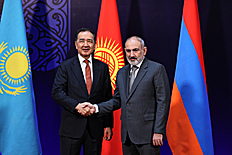 1670x1113px - 681 Kb
1670x1113px - 681 Kb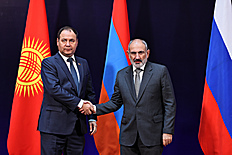 1670x1113px - 716 Kb
1670x1113px - 716 Kb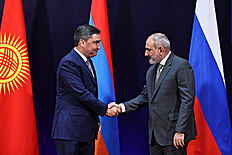 1670x1113px - 747 Kb
1670x1113px - 747 Kb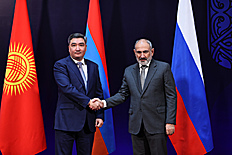 1670x1113px - 668 Kb
1670x1113px - 668 Kb 1670x1113px - 705 Kb
1670x1113px - 705 Kb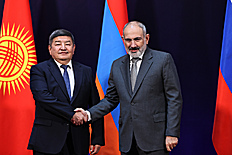 1670x1113px - 716 Kb
1670x1113px - 716 Kb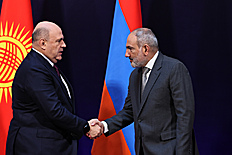 1670x1113px - 652 Kb
1670x1113px - 652 Kb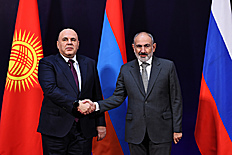 1670x1113px - 701 Kb
1670x1113px - 701 Kb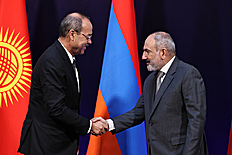 1670x1113px - 742 Kb
1670x1113px - 742 Kb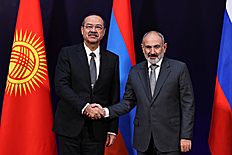 1670x1113px - 695 Kb
1670x1113px - 695 Kb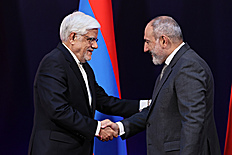 1670x1113px - 686 Kb
1670x1113px - 686 Kb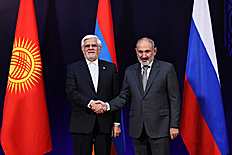 1670x1113px - 637 Kb
1670x1113px - 637 Kb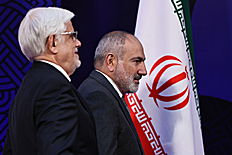 1670x1113px - 692 Kb
1670x1113px - 692 Kb 1670x1113px - 662 Kb
1670x1113px - 662 Kb 1670x1113px - 812 Kb
1670x1113px - 812 Kb 1670x1113px - 786 Kb
1670x1113px - 786 Kb 1670x1113px - 714 Kb
1670x1113px - 714 Kb 1670x1113px - 1 Mb
1670x1113px - 1 Mb 1670x1113px - 756 Kb
1670x1113px - 756 Kb 1670x1113px - 699 Kb
1670x1113px - 699 Kb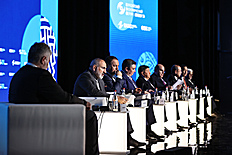 1670x1113px - 725 Kb
1670x1113px - 725 Kb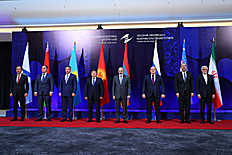 1670x1113px - 961 Kb
1670x1113px - 961 Kb 1670x1113px - 662 Kb
1670x1113px - 662 Kb 1670x1113px - 859 Kb
1670x1113px - 859 Kb
more 21 photos
Before the session of the Eurasian Intergovernmental Council, the Eurasian Economic Forum was held in Yerevan, which was attended by the heads of governments of the EAEU countries, as well as the First Vice President of the Islamic Republic of Iran, Mohammad Reza Aref, and Abdulla Aripov, the Prime Minister of Uzbekistan, which is an observer country in the EAEU.
First, the meeting ceremony of the high-ranking guests took place, and then the ceremony of joint photo-video shooting took place.
In his speech, Prime Minister Nikol Pashinyan welcomed the heads of governments and forum participants and noted: "In the modern realities of digitalization, I must first mention the importance of today's discussion, which is aimed at the effective functioning of the four freedoms, as well as the development of the digital environment and digital infrastructures.
The terms "digital economy", "digital society" and "digital transformation" have found their firm place in our daily lives, and we live in a reality characterized by technological breakthroughs. But it is very important to look back and define the concept of "digital transformation".
To me, first of all, the term "digital transformation" means achieving efficiency and flexibility in operational processes by moving from analog data to digital data.
I would like to emphasize that this definition, of course, also implies the activity of governments, but the emphasis should be placed on the whole society, because the digitization process of states should come from the convenience of citizens and businesses, not the other way around.
To build a digital society and a developed economy, we first decided to anchor our digital architecture on two important principles: trust and security.
Digital processes must be practical, up-to-date and useful for people and businesses. If this does not happen, then this is not digitization, but an imitation of digitization, which makes no sense.
In practice, it should be about the complete transformation of the work of public services. In this context, I will emphasize not only the need for digitalization of individual issues, but also the creation of such services that will satisfy the vital needs of our citizens and businesses and ensure a quick response to important events in their lives.
Successful digitization of these processes requires reliable, complete and accessible data to make public services fully transparent. This will simplify the interaction of citizens and businesses with government agencies, making it more convenient, efficient and secure.
The concept of reliable data storage occupies a central place in the philosophy of digital transformation in Armenia. This system is based on trust between government institutions and, most importantly, between citizens, businesses and the state.
Trusted data storage allows different government agencies to rely on each other's information without having to share or duplicate it. This will replace document sharing and provide access to important legal data while complying with security and national regulations on data collection, storage and processing.
Data will be stored in national segments and will only be available in cross-border format upon request.
For businesses, this process can improve cross-border trade and the way indirect taxes are paid. Let's imagine a situation where all the digital data on the movement of goods from the moment it leaves the territory of one state becomes available and traceable to the authorized authorities of another state 24/7, even before it reaches its destination.
Full payment of indirect taxes, legality of goods circulation, sanitary, phytosanitary and veterinary control, ensuring quality and safety compliance can be carried out seamlessly on the basis of legally significant data available in the registers of the sending country. This will significantly reduce administrative costs and at the same time ensure compliance with all product requirements.
We see a future where digitization will significantly expand the freedom of movement of people and the realization of citizens' right to work.
Of course, the implementation of these innovations will require significant efforts. However, we should not ignore the process that has already started, because it creates new opportunities for further development and improvement of all aspects of our partnership.
Thank you for your attention."